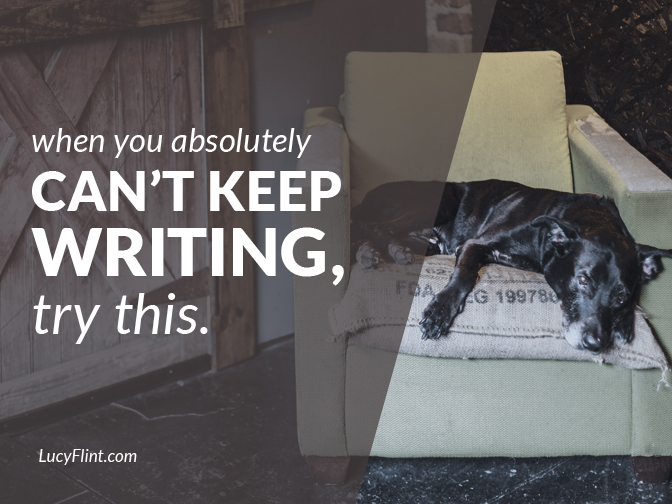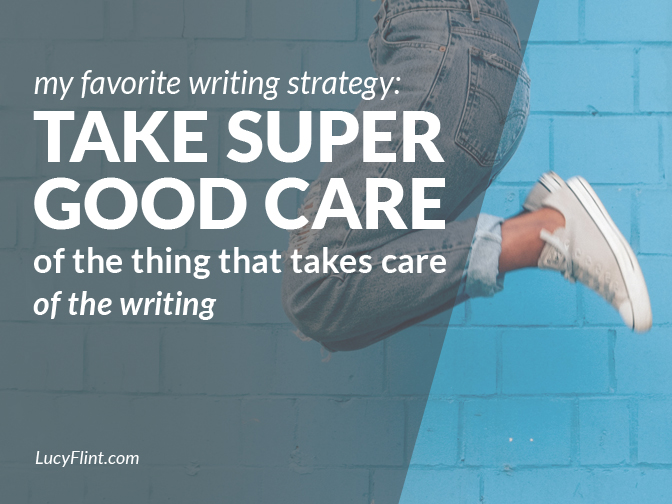Explode Your Creativity (and Just Have a Lot More Fun!) by Strengthening This One Dynamic Skill
/Have you ever read a book that felt like the author was standing waaaaay too far away from you?
There's this weird kind of distance—like they're standing outside of their own book. That incredibly tedious, frustrating sensation that the writer is writing about their story.
Know what I mean?
Their scenes feel like static, lifeless things that the writer is pointing to and explaining to me.
... Instead of whisking me up and sticking me right in the middle of the story itself.
Confession One: With this kind of book, I don't last long as a reader.
Confession Two: And I can totally become this kind of writer, when I'm not careful.
Yiiiiiiiiikes.
Spoiler alert: I'm not about to dive into the differences of "showing versus telling." And I'm not going to unpack the more descriptive styles of writing as opposed to the more stark.
Nope. What's on my mind is the big, overarching, world-shaping superpower that we all have access to as writers.
Imagination.
Today we're gonna dive into how we can strengthen that oh-so-vital aspect of our craft.
But before we start, WHY does it feel so silly to talk about imagination? Like it is so very uncool and unadult.
After kicking off this series on strength-building, I feel like I've just waltzed into a weightlifting class and announced, "Today, we fingerpaint!"
And yet. Training our imaginations has a lot more to do with athletic prowess than anything goofy or simplistic. (Not to knock fingerpainting. Fingerpainting is awesome.)
After all, my friends, we're creating people and conflicts and settings and whole worlds in our minds.
That's one heck of a barbell to hoist off the ground.
Okay? So let's not belittle ourselves by sneering at the term "imagination."
It's just the name of the muscle we happen to use for this incredibly powerful work we do.
How We Get Toned, Build Muscle, and Increase Imaginative Flexibility
As I come back to my novel after a turbulent summer, I'm realizing how much time I've spent away from the inner workings of my story. I've used my creativity to solve daily problems ... instead of using it to dive into my characters' world.
So my imagination has lost a whole lot of muscle mass. It's gotten scrawny. It skips the stairs and heads for the elevator. And its joints are all stiff and inflexible.
So when I ask it to work hard on my novel, it kinda gasps and shakes and then looks around for a bag of chips.
No bueno.
I want my novel to thrive this autumn. Right? And you want yours to be amazing too, I'm sure.
Which means it's time to build some serious strength in imagination!
So ...
So, how do we do that?
Well, a lot goes into this, for sure. We could talk about nurturing our curiosity, pouring ourselves into wonder, and taking ourselves exploring on artist dates, all of which are essential components to a full imagination-health routine.
But I think that there's one skill that's more vital than all the rest.
Something that can totally dry up when we forget how important it is. When we start "coasting," and skimp on our attention to it.
But when we practice it over and over, ohhhh, look out.
Our writing gets richer, stronger, and generally more awesome.
I'm talking about the simple yet incredibly challenging practice of fully visualizing what we are about to write.
This is the practice of taking a scene that exists as an idea in your head, and then experiencing it. As if you were there, in the scene.
Being present inside it, as completely and totally as possible.
THAT.
Yeah. Like I said: it's simple. Yet super challenging.
James Scott Bell sums up this kind of imagination practice so well in his book Plot & Structure: "Be an actor." He says:
I'll ... try to live the emotions. I'll act out the parts I've created. Almost always what I feel "in character" will make me add to or change the scene. ...
Vividly imagine the scene, step by step, in your mind. Let it play like a movie. But instead of watching the movie from a seat in the theater, be in the scene.
Be. In. The. Scene.
So—we've probably all done this to some degree. There are scenes and moments in our stories that tend to just drop into our imaginations, right? And other pivotal scenes can be easy for us to tumble into and experience vividly.
But I know that, for myself, I tend to not make this immersive imagining a key part of my writing routine.
Instead, I get by on low-grade visualizing. Barely seeing it in my head, I instead think my way through: I guess the character could say this, and then he'd reply with this, and so she'd counter with this.
But too much of that, and writing just feels like manipulating ideas of people, notions of conflict, rough sketches of setting.
Instead of the living, breathing story itself.
Instead of the kind of story that makes its readers stay up waaaaay too late at night finishing it.
The kind of story that haunts readers and inspires their dreams.
My friends, visualizing our stories changes everything.
It keeps us from standing outside a scene and writing about the action. Instead, it plunges us inside it, so that we create the scene. First in our heads, and then on paper.
And our readers? Better be prepared to be carried away.
Five Essentials for Imagination Practice
This is a practice, so be super patient. Especially if you're as rusty at it as I am!
Be incredibly kind to yourself, refuse to expect perfection, and just keep coming back to it.
As you do, here are five things to remember that might make all the difference for you.
1. Be willing to move slowly.
It's when I'm trying to hurry through my work that all pretense of richly imagining the scene just goes straight out the window.
I'll have the merest glimmer of the scene in my head as I pound it out on a keyboard.
Now, I'm not at all against writing fast: I think it's the coolest thing ever, and I want to get better at it. (Because THIS!)
But as we get ready to write quickly, our preparation time is a key moment for visualizing.
That's when we can slow down, and take the time to fully sink into whatever it is we're about to write.
If you're tempted to rush, like I can be, it's good to take a deep breath and remember what it feels like to be totally blown away as a reader.
Is it worth it, for an incredible scene?
OH yeah. Totally worth it.
2. Build the whole scene.
It's terribly easy for me to fall into a rut with what I imagine for my scenes. If I could get away with it, I'd have faceless, undetailed characters and nearly blank settings. I'm stronger on voice quality and emotional beats and overall action.
But setting details? Physical characteristics?
Ack! I have to remind myself to not leave them out.
So, as you plunge your imagination into the scene, feel into all these lifelike details:
The sensations of the air, the temperature, dampness or dryness...
The quality of the space—claustrophobic, exposed, oppressive, frivolous, light...
All the sounds: of gadgets, people, movement, weather, animals, distant traffic, or hollow stillness...
Scent. It's so easy to forget! The smells of the people, the rooms, the outdoor spaces, fabrics, foods, mustiness...
And then of course, the feel of the emotions: tension, excitement, nerves, hope, shame, uncertainty, expectation...
We could probably come up with a list five times as long as this. (Which would be awesome, but really overwhelming too, haha!)
The point is: try to be as present in your visualization of the scene as you would be in real life.
Notice what you notice. Feel what you feel. And figure out alllll the little details that affect you.
3. And definitely expect it to feel super weird.
It can help to remember: this might be really uncomfortable.
Sometimes, when I'm visualizing a scene, something in my head says, "Hold up. This is a really strange thing to be doing. NOT very normal. Not very adult. So let's not."
Right?
It's important to remember that, especially when we're new to this kind of imagination training, it might seem really weird, or childish, or wild, or uncertain.
But it's still worth it.
Basically? Keep on going, even when it feels strange.
Even if something in you wants to say, "Ack, that's enough, right? We have a general idea of this scene. Let's just hurry up and write it already."
Hang on. Even in that tough place.
Why? Because this is where strength starts to build.
Strength happens every time we don't quit when we want to quit.
Just like when we're jogging a longer route than usual, or wobbling in a yoga balancing pose, or lifting a weight that's right at our limit—we will want to quit.
We cry, "Okay, enough, I'm done!"
But if you push through the discomfort, if you hold on, then you get better, stronger, more flexible, more stable.
You're inventing worlds in your mind, my friend. It takes strength and skill. Keep going. It's worth it.
4. Don't grab the distraction bait.
When it gets tough or challenging, it's so easy to think, "I need back-up!"
So we drop out of our intense imagining, and go find: a good Google image spread, or a Wikipedia page, or maybe check out that one Instagram account, or go make coffee.
Or basically do anything but the imagining.
But the longer we can focus allllllll our attention on this, the more rich and deep and well-constructed it will be.
So if you need more details in your scene, just make them up. Even if they might not be accurate or will need updating later.
If you're getting bored and this visualizing feels tedious, add something that puts you back on your edge. Raymond Chandler would send in a man with a gun. Personally, I like to throw in something weird, off kilter, askew.
What would most re-engage your attention? Send it in there.
5. Whatever else you do, don't hold back the most essential part of the scene.
Deeply imagining a scene is a choice. And a skill. I've felt it get easier with practice... and then much harder when I'm out of practice.
So when we engage with this, we're increasing our skill, for sure.
But we're also re-choosing and re-committing to our own story.
We're deciding to live in it. Inhabit it. Participate inside it.
When I do this, I'm pushing myself to experience my story not just as a reader, but essentially as a character.
I become someone who can peer into the absolute central workings of it. I get to witness all the exquisite moments that won't make it onto the "main stage" of the finished page. I spend my working hours wandering other realities.
And that is when I feel like the writing life is the most incredible, satisfying, and adventurous life that there can be.
It's pretty freaking amazing, in other words.
What we have to remember is that this isn't just an exercise.
It isn't just a strength-building, creativity-enhancing strategy.
It's a way of life. A way of working.
And it's the most literally mind-bending part of our craft.
It gifts us with the ability to write our stories from inside of them. Instead of from a distance, like we're merely pulling puppet strings.
If we’re not imagining, we’re settling for less. Less from our stories, less for our readers, but also less of an experience as writers.
When I think of fully imagining a scene, I'm reminded of this quote by—guess who!—Julia Cameron, in her book Walking in This World. (She's referring to the start of a larger project, but I think it applies equally well to this idea of visualizing our stories.)
She writes:
Horseback riders who jump the Grand Prix fences of terrifying heights talk of "throwing their heart" over the fence so their horse jumps after it. We must do the same.
That image just grabs me. Can't that be how we pursue this?
Let's not make visualizing just one more static exercise for mere technical improvement.
Let's turn it into an opportunity to throw our hearts more fully into our scenes.
And let the action and the details and the writing itself jump after it—to great heights.

















